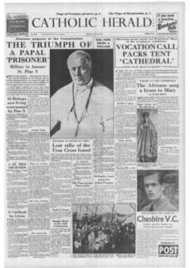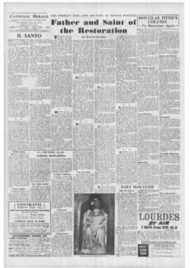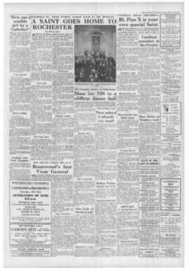Page 3, 28th May 1954
Page 3

Report an error
Noticed an error on this page?If you've noticed an error in this article please click here to report it.
Tags
Share
Related articles
Fortitude And Temperance, By Josef Pieper
Finding Out About St. Thomas
Lenten Reading
Alcuin On The Latest Books
Anthology Of Thought
Professor's meditation on
THE END OF THE WORLD
By Father Thomas Corbtshley, S.J.
Master of Campion Hall
THE END OF TIME: A Medita tion on the Philosophy of History, by Josef Pieper (Faber, 10s. 6d.).
ROF. PIEPER, whose thought matured during the period of the Nazi ascendency in Germany, has long been known in that country for the profundity of his philosophic reflection and the sense of actuality which his writing conveys. This latest of his works to appear in English will undoubtedly add to his reputation in this country.
It is aptly sub-titled a "meditation," for it is clearly the product of a man accustomed to wide-ranging and deep-searching contemplation in a spirit of true Christian faith and hope. In a sense, perhaps, the message of the book is no more than the age-old lesson of the Cross. Chesterton would recognise a kindred mind:
I tell you naught for your comfort, Yea naught for your desire, Save that the sky grows darker yet And the sea rises higher.
Nio hysteria TF we seek an explanation of hisltory in terms of this world we are doomed lo disappointment and despair. The consummation of the world-story will be the arrival of Anti-Christ, the establishment of "the strongest world-power in history," finding its most extreme intensification in the "consummation of the military, political and economic merger in the religious united front," the object of the religious cult being the world ruler himself.
This might be mere hysteria. Yet Prof. Pieper's thought is so closely integrated with traditional Christian eschatological and apocalyptic literature that to dismiss it as hysteria would be to deny an important element in the Christian tradition.
Nor is there anything approaching hysteria in his treatment. On the contrary, the book gives the impression throughout of being the work of a mind facing reality at its most challenging, accepting the challenge and overcoming the threat to hope by seeing that the ultimate basis of the Christian hope is to be found in a world beyond the menace of any this-world power.
Bewildered men IN the course of his treatment, the author tells the story of two Tibetan youths found amongst German prisoners in an American prisoner-ofwar camp. Their fantastic Odyssey is a parable of the Christian's attitude to history.
Crossing from Tibet into the U.S.S.R. to spend a summer, as they thought, working to earn money, they found themselves drafted into the Russian army (it was the summer of.1941), hastily trained and sent to the front, where they were captured by the Germans.
In turn drafted into the German army, captured by the Americans,
sent across the Atlantic, they eventually asked for an explanation of what was happening-what the shooting was all about. They understood "nothing of the structure of the modern State, nothing of the constellation of powers, nothing, of the intermingling of political, economic and technical power . . . indeed the world as a whole, the earth as a planet, Was undoubtedly not present to them at all."
Under a cloud NOW-and this is the point of the story assuming in the Tibetians a faith in divine purpose, their entire ignorance about what was happening in concreto made no difference to their faith.
The most extensive knowledge of concrete history .. without this conviction of an, in some way, absolutely guaranteed meaning of history as a whole, is not capable of affording this inner sense of position and direction."
Enough has perhaps been said to indicate the quality of a book which, in a world overshadowed by the monstrous cloud of Eniwetok, is of urgent topicality. It does not afford easy or comfortable reading (and at times one feels that the translator might have softened for English readers the rugged syntax of his original), but it is an immensely rewarding and s:isfying study.
blog comments powered by Disqus











